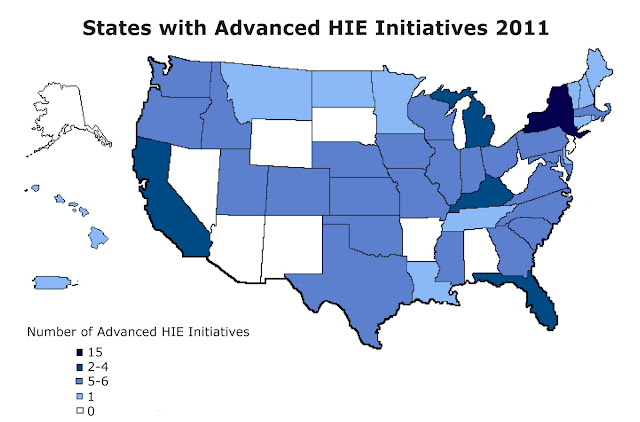The survey shows the number of States with advanced HIE initiatives increasing with New York leading the way:
“Some exchanges have solved their technical issues and are offering more advanced services, such as analytics, quality reporting, wellness programs and education to providers and hospitals. As a result, they are in a much stronger position than those that have not expanded services,” said Jennifer Covich Bordenick, Chief Executive Officer. “HIE initiatives that cannot adapt quickly may not last long in a transformed healthcare system. The HIE marketplace is very competitive today, but the momentum seems to be with private sector HIEs,” added Covich Bordenick.
Some key findings from the 2011 survey include:
- There has been net growth of 9% in the number of initiatives, which total 255 in 2011. At least 10 HIE initiatives have closed or consolidated, and 46 new initiatives responded to the survey. Twenty-four initiatives report that they have sustainable business models, up from 18 in 2010.
- Initiatives are developing complex privacy controls for patients, even in the absence of new federal requirements.
- An increased number of behavioral or mental health providers report providing and viewing more data through exchanges.
- Despite uncertainty about accountable care organizations (ACOs), a quarter of the respondents indicated that they will support an ACO.
- In addition to struggling with business models and value, groups are facing new challenges related to technical aspects and systems integration.
- A majority of initiatives (113) plan to incorporate the federal Nationwide Health Information Network’s (NwHIN) Direct Project into their service offerings.
- The majority of advanced initiatives (85) are offering at least one service that supports Meaningful Use requirements.
“The number of initiatives offering services that improve patient care has increased in 2011. As more HIE initiatives provide services such as ePrescribing, alerts to providers on drug interactions, clinical decision support, and medication reconciliation, the quality of care for patients will improve,” Covich Bordenick said. “When providers have access to vital patient information and consequently receive important alerts, patients benefit.”
As HIEs continue to move forward, eHI recommends the following:
- HIEs must move quickly to help providers with meaningful use, Medicare Shared Savings Program rules and privacy recommendations. Hesitancy about moving forward until changes to the healthcare system are complete will only diminish growth.
- Privacy will continue to be an important issue for patients. If patients are to be engaged in their care, they have to trust that their information can be securely exchanged. One way of many to build this trust framework: initiatives can offer patients more than a global consent model.
- Groups need to “work with what they have.” Since initiatives need to rapidly innovate and move through the stages of development quickly, they need to consider working with the existing infrastructure in their geography. Where there are well-developed IDNs or health systems, the community-based or state initiatives should try to work with them. While competition can be good for innovation, in the current rapidly changing healthcare market, competition may not be the best option for sustainability.



No comments:
Post a Comment